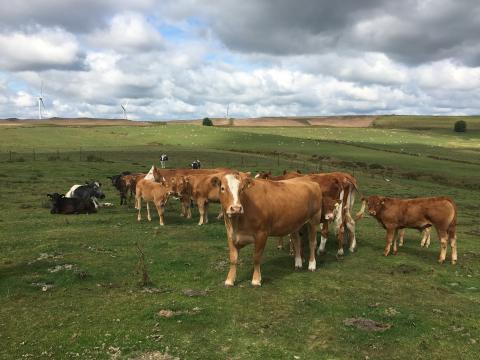14 January 2021
A Welsh upland farm is spending less on feed and fertiliser and is finishing lambs four weeks earlier since improving soils and animal health management.
The Davies family farm 320 acres at Waen Gwyn, Cefn Coch, Welshpool, where they run a flock of 750 ewes and 25 suckler cows; they also rent another 45 acres of land.
Chris Davies, who farms with his father and grandfather, Glyn and Jim, and step-brother, Mark Bellerby, has taken advantage of multiple Farming Connect initiatives.
He credits these and his membership of the Farming Connect-run Severn Valley Sheep Discussion Group for the improvements the business has made with grassland and livestock performance.
The foundation to these was a Nutrient Management Plan (NMP) provided through the Farming Connect Advisory Service.
Chris has since had input from leading soil and grassland specialists, Mark Tripney and Chris Duller, by accessing other Farming Connect initiatives.
“We have found that if you get your soils right everything else just follows, it all starts with the soil,’’ he says.
“Since addressing compaction issues and revising our fertiliser policy we are growing better quality grass and more of it and that means our ewes and cows are more productive and our lambs and cattle are quicker to fatten.’’
Chris was advised that the business was spending money unnecessarily on a slow-release fertiliser.
“We had used that fertiliser for years but learned that it wasn’t what our soils needed; it was actually making the situation worse.’’
As a result, they now use a cheaper, standard fertiliser treatment for grassland.
Chris was advised to use a sub-soiler on compacted ground. The grazing pattern of the sheep flock confirmed it was the right decision.
“The sheep grazed the half of the field that we had subsoiled the ground. You could see a line down the middle of the field showing where their grazing preference had been,’’ says Chris.
While the Davies’ have reduced their fertiliser costs their biggest saving is on concentrates.
Lambs from the flock of 750 mostly Texel x Mule and Mule ewes are weaning at 100 days, a month earlier than previously, and the majority are finished on grass only.
Soil and grass sampling, which is 100% funded through the Farming Connect Advisory service group advice, revealed a deficiency of selenium, an important trace element in livestock fertility.
Cattle are now bolused and this year the entire herd scanned in-calf.
Chris had funding through Farming Connect to fertility test the stock bull after a poor year for fertility.
“That test gave us the confidence that he is performing at his optimum,’’ says Chris.
He has also been working with Hafren Vets, Newtown, to eradicate BVD from the herd and this has been successful with the herd accredited as BVD-free.
To protect animal health, the herd is run as a closed herd apart from purchased bulls.
Other services Chris has taken advantage of through Farming Connect include an on-farm Red Meat Clinic run by Precision Grazing and several courses including spraying and sheep dipping.
As Farming Connect Development Officer for North Montgomeryshire, Owain Pugh has helped Chris to access these services.
"At a time when reducing cost of production and improving herd and flock efficiency is of the utmost importance, farmers should consider seeking external advice.
Sometimes, someone looking 'in' from the 'outside' will see something different and even a small change can make a big difference to your business.
Farming Connect’s local development officers can put you in contact with industry leading advisors, and offer funding for advice that could make a big difference to your business."
Chris urged others to make use of the Farming Connect Advisory Service.
“As farmers, we must be willing to consider making changes instead of continuing with the same practices if we are not getting the best from the land and our stock, unless we do that, our businesses won’t progress.’’

